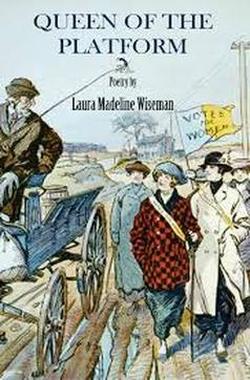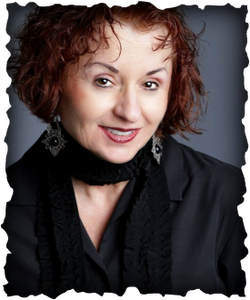Review: Queen of the Platform by Laura Madeline Wiseman

Queen of the Platform by Laura Madeline Wiseman
Paperback: 84 pages
Publisher: Anaphora Literary Press (2013)
Purchase: Available at Amazon.com
Review by Susana H. Case
It is rare that a poet who writes about a member of his or her family has access to historical sources, though, even here, there were many gaps in the documentary record. Laura Madeline Wiseman has the good fortune to be linked through her family history to Matilda Fletcher, suffragist, writer, lecturer, inventor (of an improved portable trunk for lady poets, writers, and orators). Fletcher is the subject of Queen of the Platform, Wiseman’s second book, which should interest all readers of well-crafted poetry, not only those interested in historical poems. In a poem formed by a collage of quotations from various nineteenth century newspapers, as well as comments by Elizabeth Cady Stanton and Susan B. Anthony, Wiseman writes:
Though she is a sensible writer and an easy speaker,
the sooner she subsides the better it will be for her
reputation. She’s out of place. She’s mistaken her calling.
Is there no other way suffragists can secure what they covet?
(“Spell for Appearances: Clipped Notes on Matilda”)
Wiseman also uses telegrams, letters, journals and Fletcher’s books, combined with her poetic imagination, to evoke a linear timeline in 19th century America, a time when girls weren’t educated and to create a personality vivid on the page, not just stick-figured, but well-rounded, filled-in:
...I asked
for a kiss—a heat of summer,
of June days heavy with humidity
and sweat—this warmed us,
where our lips touched again
(“Journal Entry: On a New Year”)
A fighter of injustices, though she didn’t live long enough to see women obtain the right to vote, she is envisioned in “Summoning Pieces” casting the vote she worked so hard to obtain for President Obama.
...Part of the research
is the drive through the gates to find you
in the middle of the snow covered hills
and to trace the grooves of our last name.
You didn’t live to, I did, but I imagine how
you’d have cast your vote for this president.
There is no known photograph of Fletcher; nevertheless, images of her lectures on behalf of women’s rights, civil service reform, and other issues of the day, her efforts on behalf of attaining justice for her brother, George W. Felts, convicted of murder, leap from these poems. The historical record on George W. Felts is meager compared to that of Fletcher, yet enhanced by the creative talents of Wiseman. From his incarceration in Illinois Penitentiary, Joliet, 1905:
Because my ears ring, three men undertook
to amuse themselves with me in the dark.
One tried to trip me up as I passed him.
Another grabbed the flesh of my neck
and bent me down. A third came up to my back.
It was dark. I could not see. I heard chimes, bells, nothing.
(“Trap”)
The other men in her life were her two husbands. On her reaction to the death of her first husband, John A. Fletcher, she writes, I might have the body of a woman / but the heart I carry is all man. (“Dissolution”) Her second husband was a clergyman and later became her agent and also figures prominently in the poems.
Wiseman ends the book where Fletcher’s career began:
That night John whispered,
You could do that, speak on stage.
I said, You read my mind.
(“Where It Began”)
Using experimental and also traditional forms, Wiseman creates portraits not only of these personalities, but of the time in which they lived. Queen of the Platform is evocative of the struggles of all women to create resonant lives for themselves at a time when their power was relatively sparse. Fletcher had the support of the men in her life, but had strength and resilience apart from this. She is the intriguing center of a collection of poems that will sear itself in the reader’s memory.
Paperback: 84 pages
Publisher: Anaphora Literary Press (2013)
Purchase: Available at Amazon.com
Review by Susana H. Case
It is rare that a poet who writes about a member of his or her family has access to historical sources, though, even here, there were many gaps in the documentary record. Laura Madeline Wiseman has the good fortune to be linked through her family history to Matilda Fletcher, suffragist, writer, lecturer, inventor (of an improved portable trunk for lady poets, writers, and orators). Fletcher is the subject of Queen of the Platform, Wiseman’s second book, which should interest all readers of well-crafted poetry, not only those interested in historical poems. In a poem formed by a collage of quotations from various nineteenth century newspapers, as well as comments by Elizabeth Cady Stanton and Susan B. Anthony, Wiseman writes:
Though she is a sensible writer and an easy speaker,
the sooner she subsides the better it will be for her
reputation. She’s out of place. She’s mistaken her calling.
Is there no other way suffragists can secure what they covet?
(“Spell for Appearances: Clipped Notes on Matilda”)
Wiseman also uses telegrams, letters, journals and Fletcher’s books, combined with her poetic imagination, to evoke a linear timeline in 19th century America, a time when girls weren’t educated and to create a personality vivid on the page, not just stick-figured, but well-rounded, filled-in:
...I asked
for a kiss—a heat of summer,
of June days heavy with humidity
and sweat—this warmed us,
where our lips touched again
(“Journal Entry: On a New Year”)
A fighter of injustices, though she didn’t live long enough to see women obtain the right to vote, she is envisioned in “Summoning Pieces” casting the vote she worked so hard to obtain for President Obama.
...Part of the research
is the drive through the gates to find you
in the middle of the snow covered hills
and to trace the grooves of our last name.
You didn’t live to, I did, but I imagine how
you’d have cast your vote for this president.
There is no known photograph of Fletcher; nevertheless, images of her lectures on behalf of women’s rights, civil service reform, and other issues of the day, her efforts on behalf of attaining justice for her brother, George W. Felts, convicted of murder, leap from these poems. The historical record on George W. Felts is meager compared to that of Fletcher, yet enhanced by the creative talents of Wiseman. From his incarceration in Illinois Penitentiary, Joliet, 1905:
Because my ears ring, three men undertook
to amuse themselves with me in the dark.
One tried to trip me up as I passed him.
Another grabbed the flesh of my neck
and bent me down. A third came up to my back.
It was dark. I could not see. I heard chimes, bells, nothing.
(“Trap”)
The other men in her life were her two husbands. On her reaction to the death of her first husband, John A. Fletcher, she writes, I might have the body of a woman / but the heart I carry is all man. (“Dissolution”) Her second husband was a clergyman and later became her agent and also figures prominently in the poems.
Wiseman ends the book where Fletcher’s career began:
That night John whispered,
You could do that, speak on stage.
I said, You read my mind.
(“Where It Began”)
Using experimental and also traditional forms, Wiseman creates portraits not only of these personalities, but of the time in which they lived. Queen of the Platform is evocative of the struggles of all women to create resonant lives for themselves at a time when their power was relatively sparse. Fletcher had the support of the men in her life, but had strength and resilience apart from this. She is the intriguing center of a collection of poems that will sear itself in the reader’s memory.

Susana H. Case is a Professor and Program Coordinator at the New York Institute of Technology. Her photos have appeared in Blue Hour Magazine,pacificREVIEW, and San Pedro River Review, among others. Author of several chapbooks, her Slapering Hol Press chapbook, The Scottish Café, was published in a dual-language version, Kawiarnia Szkocka, by Poland’s Opole University Press. She is the author of four full-length collections, most recently, 4 Rms w Vu (Mayapple Press). Please visit her online at: http://iris.nyit.edu/~shcase/.
